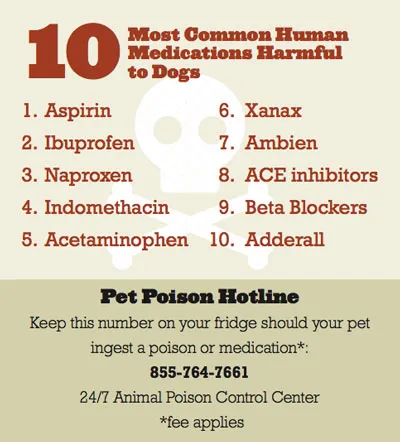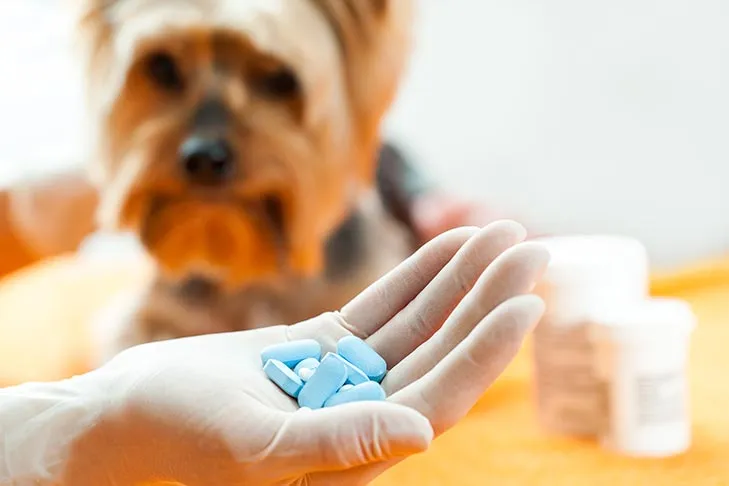The safety of our beloved canine companions is a top priority, yet accidental poisonings remain a significant threat. One of the most dangerous areas in any home is often the bedroom, particularly the nightstand, where essential human medications are kept within easy reach. Many dogs and curious teething puppies often share our beds, making these drugs readily accessible. Similarly, medications left on kitchen or bathroom counters can quickly become a target for a bored or inquisitive dog. If your dog ever does ingest human medication, especially a blood pressure pill, immediate action is crucial. Always bring the original container to your veterinarian, as it provides vital information about the drug, its strength, the quantity ingested, and potential manufacturer warnings regarding poisoning.
Why Human Medications Pose a Grave Danger to Dogs
Human medications are formulated for human physiology and metabolism, which differ significantly from a dog’s. What might be a therapeutic dose for a person can be toxic, even lethal, for a dog, depending on their size, weight, and the specific drug. This is particularly true for potent medications like those used to regulate blood pressure. While the original article touched on various dangerous drugs, the ingestion of a blood pressure pill by a dog warrants immediate and specialized attention due to its rapid and severe impact on their cardiovascular system.
 Dangerous human medications list for dogs
Dangerous human medications list for dogs
Other Common Dangerous Drugs for Dogs
While our focus is on blood pressure medication, it’s important to remember that many other common human drugs are highly toxic to dogs:
- NSAIDs (Nonsteroidal Anti-inflammatory Drugs): Such as aspirin, ibuprofen, and naproxen, can cause gastrointestinal irritation, ulcers, kidney damage, liver disease, and clotting problems.
- Acetaminophen (Tylenol): Can lead to severe liver damage and failure, causing lethargy, loss of appetite, belly pain, jaundice, and swelling of the face and paws. Cats are even more sensitive.
- ADHD Medications: Often containing amphetamines, these stimulants can cause life-threatening tremors, seizures, elevated body temperature, and cardiac arrest.
- Sleep Medications: Drugs like Xanax, Ambien, and Valium can cause profound lethargy, incoordination, dangerously slowed breathing, or, paradoxically, severe agitation in dogs.
The Critical Danger of Blood Pressure Medications for Dogs
Blood pressure medications are among the most frequently prescribed drugs for humans and, consequently, are often found in homes. When a Dog Ate Blood Pressure Pill, the situation is an emergency. These medications are designed to alter cardiovascular function, and even a small dose can have profound, life-threatening effects on a dog.
Types and Their Specific Dangers:
- ACE Inhibitors (e.g., Lisinopril, Enalapril, Benazepril): These drugs work by dilating blood vessels, which lowers blood pressure. While generally considered less acutely toxic than other blood pressure medications in small doses, larger ingestions can still cause significant drops in blood pressure (hypotension), weakness, and lethargy.
- Beta-Blockers (e.g., Atenolol, Metoprolol, Propranolol): These are particularly dangerous. Beta-blockers slow the heart rate and reduce the force of heart muscle contractions, leading to a rapid and severe drop in both heart rate (bradycardia) and blood pressure. Symptoms can progress quickly to collapse, cardiac arrest, and even seizures.
- Calcium Channel Blockers (e.g., Amlodipine, Diltiazem, Verapamil): Highly toxic, these medications relax blood vessels and can slow the heart rate and reduce contractility. Ingestion can lead to severe and prolonged hypotension, very slow heart rates (bradycardia), weakness, vomiting, and can sometimes cause acute kidney injury or heart failure.
Symptoms Your Dog May Exhibit After Ingesting a Blood Pressure Pill
If your dog has ingested a blood pressure pill, you might observe a range of symptoms, often appearing rapidly, depending on the type of medication and the amount consumed. Common signs include:
- Weakness and Lethargy: Your dog may seem unusually tired, unwilling to move, or generally subdued.
- Stumbling or Ataxia: Difficulty walking, loss of coordination, or appearing “drunk.”
- Collapse: In severe cases, your dog may suddenly lose consciousness.
- Pale Gums: A sign of poor circulation dueating to low blood pressure.
- Bradycardia: An unusually slow heart rate. This is a critical symptom, especially with beta-blockers.
- Vomiting: May occur as the body tries to rid itself of the toxin.
- Dizziness or Disorientation: Appearing confused or unable to focus.
What to Do Immediately If Your Dog Ate a Blood Pressure Pill
Time is of the essence. If you suspect your dog ate blood pressure pill, follow these critical steps:
- Stay Calm: Panic can hinder your ability to act effectively.
- Collect Information:
- What medication? Identify the exact drug (brand and generic name).
- What strength? Look for the milligram dosage.
- How many pills? Estimate the maximum possible number ingested.
- When did it happen? The timeframe is crucial for treatment options.
- Your dog’s weight and any existing health conditions.
- Call Your Veterinarian or an Emergency Vet Immediately: Do not wait for symptoms to appear. This is a medical emergency. Do NOT induce vomiting unless specifically instructed by a veterinarian, as it can be dangerous with certain medications or if your dog is already showing severe symptoms.
- Transport Your Dog: Be prepared to take your dog to the veterinary clinic or emergency animal hospital without delay.
Veterinary Treatment for Blood Pressure Pill Ingestion
Upon arrival at the veterinary clinic, the treatment plan will depend on the type and amount of medication ingested, the time since ingestion, and your dog’s current condition.
- Decontamination: If ingestion was recent (typically within 1-2 hours) and your dog is stable, the vet may induce vomiting. Following this, activated charcoal may be administered to absorb any remaining toxins in the gastrointestinal tract.
- Supportive Care: Intravenous fluids are often given to help stabilize blood pressure and support kidney function.
- Medications: Specific medications may be used to counteract the effects of the blood pressure pills. For severe hypotension, vasopressors (drugs to raise blood pressure) may be administered. For bradycardia, drugs like atropine might be used. In some cases of severe beta-blocker or calcium channel blocker toxicity, treatments like insulin and dextrose, or lipid emulsion therapy, might be considered.
- Monitoring: Your dog will require intensive monitoring of their heart rate, blood pressure, electrocardiogram (ECG), and overall vital signs, often requiring hospitalization.
Remember that early intervention drastically improves the prognosis. Prompt veterinary care is the best chance for a positive outcome.
 Yorkshire Terrier looking at a human medication pill
Yorkshire Terrier looking at a human medication pill
Prevention is Paramount
The easiest way to prevent a crisis like a dog ingesting a blood pressure pill is through stringent prevention:
- Secure Storage: Always keep all human medications, prescription or over-the-counter, in secure, pet-proof containers and stored in high, inaccessible cabinets or drawers. Child-proof containers are a good start, but many dogs can still chew through them.
- No Pills on Counters: Never leave pills on nightstands, counters, or tables, even for a moment. A curious dog can snatch them in an instant.
- Be Mindful of Dropped Pills: If you drop a pill, find it immediately. Dogs are incredibly quick to snatch fallen items off the floor.
- Educate Family Members: Ensure everyone in the household understands the importance of proper medication storage and handling.
- Proper Disposal: Dispose of old or unused medications safely, as recommended by your local authorities, to prevent pets (and children) from accessing them.
- Regular Health Checks: While not directly related to pill ingestion, staying on top of your dog’s overall health, including comprehensive parasite prevention like worm, tick, and flea treatment, helps ensure they are in the best possible condition to handle any accidental toxic exposure. You can explore options like flea and tick liquid solutions or even best tick removal medicine. Finding effective flea treatment and knowing the best medicine for ear infection in dogs are also important aspects of responsible pet ownership, although distinct from medication poisoning.
Conclusion
The ingestion of a blood pressure pill by a dog is a serious veterinary emergency. Understanding the inherent dangers of these medications, recognizing the symptoms of poisoning, and knowing the immediate steps to take can be life-saving. Prevention through secure storage is the ultimate defense. If an accident occurs, do not hesitate—contact your veterinarian or an emergency animal hospital immediately. Prompt, professional medical attention is the key to ensuring your beloved pet has the best chance for recovery.
References
- Pet Poison Helpline. (n.d.). Top Toxins. Retrieved from https://www.petpoisonhelpline.com/pet-owners/top-10-pet-poisons/
- ASPCA Animal Poison Control Center. (n.d.). People Foods to Avoid Feeding Your Pets. Retrieved from https://www.aspca.org/pet-care/animal-poison-control/people-foods-avoid-feeding-your-pets
- Plumb, D. C. (2018). Plumb’s Veterinary Drug Handbook (9th ed.). Wiley Blackwell.
